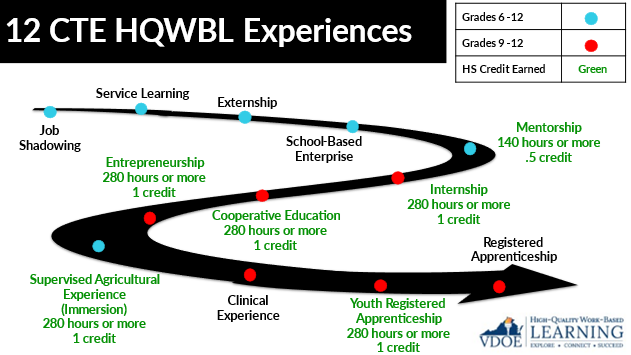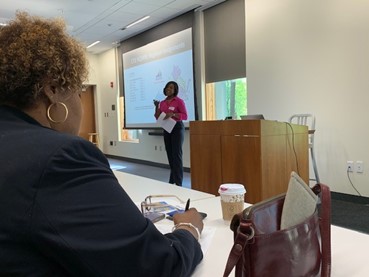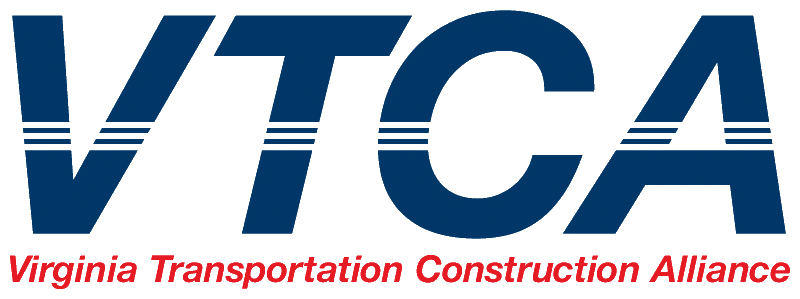High-Quality Work-Based Learning: The Basics
In April, VTCA held its second workshop addressing workforce development needs for members. Nearly 50 firms, local Career Technical Education (CTE) administrators, Virginia Department of Transportation (VDOT), Department of Education (DOE), and Department of Labor and Industry (DOLI) staff attended to learn about and discuss ways to better engage future employees. The takeaway was: This opportunity can work, and the construction testimonials prove it.
DOE and DOLI are both committed and energized to helping those who want help on workforce development. If you are not currently involved with your local schools, then you are behind your competition. The state and your local CTE have the tools and framework to get you caught up.
In August 2022, the DOE established High-Quality Work-Based Learning (HQWBL) which is comprised of school-coordinated workplace experiences that are:
- related to students’ career goals and/or interests.
- connected to a course.
- performed in partnership with local businesses and organizations.
HQWBL develops 12 various levels of experiences to enable students to apply classroom instruction in a real-world business. The 12 HQWBL experiences. High-Quality Work-Based Learning Opportunities in Virginia gives a summary of the criteria for each HQWBL experience.
HQWBL experiences are available year-round. While many students work during the calendar school year, experiences are also available during the summer months.
The HQWBL experience component builds on the benefits of the other two components by assisting students with the transition from the classroom to the workplace. Students’ knowledge, skills, and attitudes are enhanced by participation in supervised, authentic experiences.
 |
|
High-Quality Work-Based Learning (HQWBL)
Career and Technical Education High Quality Work-Based Learning Guide is based on the redesigned methods of instruction effective August 4, 2022. This implementation guide focuses on the 12 types of HQWBL methods of instruction used in Virginia: job shadowing, service learning, mentorship, externship, school-based enterprise, internship, entrepreneurship, clinical experience, cooperative education, youth registered apprenticeship, registered apprenticeship. Along with these opportunities, students can earn credits toward graduation in addition to credits earned through the associated CTE course in cooperative education, internship, entrepreneurship, youth registered apprenticeship, and supervised agricultural experience. It includes Virginia regulations and guidelines for the administration of HQWBL and provides resources for Work-Based Learning coordinators. School divisions should use this guide to implement HQWBL offerings locally.
High-Quality Work-Based Learning Methods of Instruction
There are twelve different HQWBL methods of instruction currently practiced in Virginia – job shadowing, service learning, mentorship, externship, school-based enterprise, internship, entrepreneurship, clinical experience, cooperative education, youth registered apprenticeship, registered apprenticeship, and supervised agricultural experience. As students participate in HQWBL experiences, their various paths can be grouped into three categories – career awareness, career exploration, and career preparation.
Career Awareness
Career awareness activities prepare students for HQWBL experiences. These activities (Classroom talks, career fairs) are designed to increase student awareness of personal interests and talents along with the education and training needed to pursue a career goal.
Career Exploration
Career exploration experiences encourage students to develop personal career interests, a better understanding of pathways to a chosen career, and the workplace readiness skills needed to make informed decisions regarding secondary and postsecondary education and training.
Career Preparation
Career preparation experiences deepen student knowledge and develop skills necessary for success in employment and postsecondary education. These experiences are recommended for students who have a clear goal of entering the workforce directly after high school or of enrolling in a closely related postsecondary training program.
High-Quality Work-Based Learning Training Agreement
Accompanying each HQWBL experience is a training agreement, a written statement of commitment made by the student, parent/guardian, WBL coordinator, and employer. It contains mutually agreed-upon expectations for all parties involved, spells out each party’s role, and addresses considerations such as employment terms, schedule, duration of work, compensation, and termination.
 |
|
| Erika Temple - Work-Based Learning Specialist, DOE |
High-Quality Work-Based Learning Training Plan
A training plan is a document identifying the classroom instruction and workplace training that will contribute to the employability and ongoing development of a student (See 8VAC20-120-20).
The training plan development process is continuous. It begins with identifying a realistic career objective and the training needs for each student and continues throughout the entire WBL experience with revising the plan according to the changing needs of the employer.
The plan serves as a record of the student’s progress throughout the experience and provides documentation for evaluation. It should include developing the technical skills required by the occupation and enhancing workplace readiness skills. A sample training plan is provided in the HQWBL Guide in Appendix A - Universal Forms.
To learn more about the HQWBL in your area click here.
The key to this effort is partnering with your local school. As stated during our presentation partnering is each side gets something out of the effort: Students learn more about a specific career, employers get access to future talent, schools get a student more motivated and energized about their work. It’s a win-win-win.
To solidify the discussion, local CTE staff discussed how their program works and who are some of the participants. Virginia’s CTE programs include the following components:
- Classroom instruction – the essential component for students to master the academic and technical competencies, attitudes, and work ethic necessary for career success and lifelong learning.
- Career and Technical Student Organizations (CTSOs) – organizations that provide experiences that reinforce and strengthen classroom learning and prepare students for individual responsibility, teamwork, and leadership in their chosen career pathways.
- WBL experiences – opportunities for students to apply and refine knowledge, attitudes, and skills through professionally coordinated and supervised work experience related to career goals.
Construction firms provided testimonials on the benefits they have learned by going through the effort. Some get a sense of community by giving back to the schools, others see potential new hires. All agreed each firm needs to start small and work their way through the effort.
